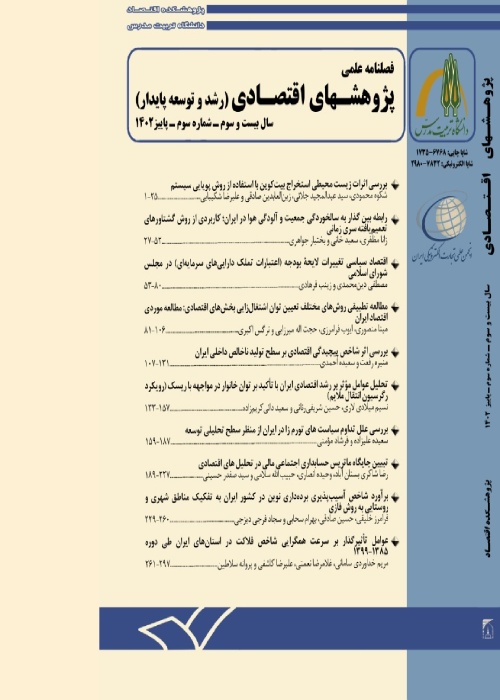Privatization on Environmental Pollution in Iran: Application of TVP-VAR Method
Aim and Introduction :
Nowadays, the environmental impacts of human activities are considered one of the limitations of economic growth. Developing countries are facing the problem of environmental degradation, which hinders economic growth and development. On the other hand, the process of economic development of countries has become one of the environmental challenges and one of the most critical concerns of policymakers over the years. Due to the significant role of the government in the economy of the countries, government economic enterprises are also sources of pollution along with the private sector. The main reason is the unprecedented concentration of greenhouse gases, which leads to the intense and continuous production of carbon dioxide gas. In addition to being a dangerous factor for human health, air pollution also has an economic burden on societies, which causes a decrease in the quality of life and the welfare of society. Thus, developing countries, including Iran, are facing the problem of environmental degradation. Privatization can be a helpful policy and a government tool to influence economic productivity and social welfare through ecological pollution control. Most domestic research on privatisation's impact on environmental pollution has been interview-based and qualitative. For this reason, this research aims to investigate the impact of privatization on carbon dioxide emissions in Iran using the time-varying parameter vector autoregression (TVP – VAR) model. The model is considered dynamic due to the time factor, and the impact of privatization on environmental pollution in Iran can be accurately observed in different years.
The present study investigates the impact of privatization on environmental pollution in Iran during 1991-2020 using the data of the Privatization Organization, the Central Bank of Iran, the World Bank, the Globalization Index website, and the energy balance sheet of the Ministry of Energy. Furthermore, the time-varying parameter vector autoregression (TVP – VAR) model has been used to study the relationship between variables. In this method, the optimal interval length of the model was determined first. Then, the data durability was checked through the unit root test of Zivot and Andrews (1992), considering the structural break. The next step examined cointegration tests, serial correlation, variance heteroscedasticity, and polynomial inverse root circle tests. In the end, the results of the impulse response function of the TVP – VAR model were presented. For this purpose, the emission rate of carbon dioxide has been used as an index of pollution, and the value of the transfer of shares and assets from the public sector to the private sector has been considered an index of privatization. The TVP – VAR method, unlike the vector autoregression model, allows the calculation of variable coefficients over time. Due to changing conditions, structural break and cyclical changes were observed in time series in macroeconomics. As a result, the TVP – VAR model enabled us to accurately obtain the nature of the economic structure’s temporal changes.
In this research, the mechanisms of the impact of privatization on environmental pollution have been analyzed, and the time series data of 1991-2020 and the TVP-VAR model have been used as experimental work. The present research findings show that despite the incomplete, unscientific, and politicized implementation of privatization in Iran, privatization has reduced the emission of carbon dioxide gas in Iran.
Based on the results, the relationship between the privatization index and environmental pollution is confirmed. It indicates that privatization has a negative and significant effect on the emission of carbon dioxide in Iran. With the increase of privatization, pollution is decreased because when privatization increases, the productivity of labor and capital and the access to new technology for reducing pollutants is also increased. In developing countries like Iran, economic issues are prioritized over environmental considerations, leading to policymaking without considering environmental costs. In contrast, by including environmental calculations in the studies related to economic policies, it is possible to view the environmental damage caused. Based on the results, it is concluded that the economic globalization index, investment, gross domestic product without oil, and human development index have significant and positive effects on production and carbon dioxide emissions. When the size of the government increases, efficiency and productivity decrease. In Iran, one solution can be importing environment-friendly technologies and more investment in this area. According to the results, it can be seen that the increase in privatization can reduce greenhouse gases, and this is due to the rise in the efficiency of private companies in the exploitation and optimal use of natural resources. Thus, policymakers can consider privatization as a part of the solution to fight environmental pollution.3
- حق عضویت دریافتی صرف حمایت از نشریات عضو و نگهداری، تکمیل و توسعه مگیران میشود.
- پرداخت حق اشتراک و دانلود مقالات اجازه بازنشر آن در سایر رسانههای چاپی و دیجیتال را به کاربر نمیدهد.


